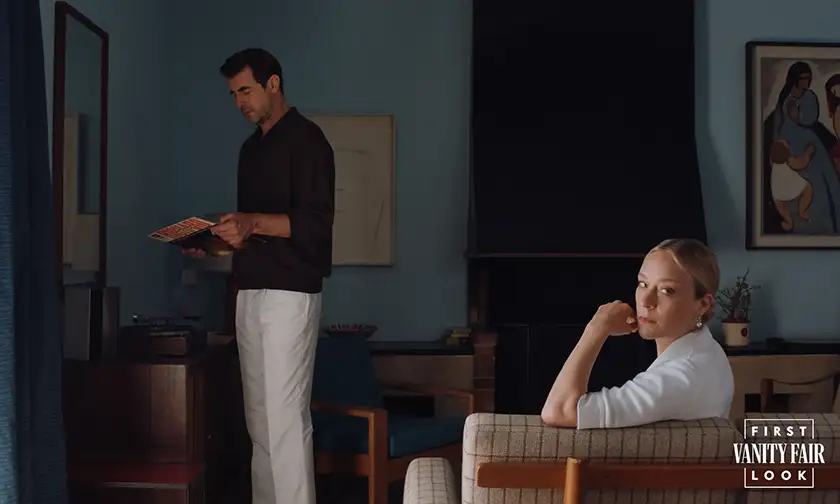In Durga Chew-Bose’s unimaginative adaptation of the seminal novel Bonjour Tristesse, a young woman comes of age over a summer in Southern France.
Writer & Director: Durga Chew-Bose
Genre: Drama, Romance
Run Time: 110′
TIFF Screening: September , 2024
Release Date: May 2, 2025 (limited)
Where to Watch: in select US theaters
Considering the acclaim and scandal it inspired on publication in 1954, it’s some mystery why Françoise Sagan’s “Bonjour Tristesse” is so poorly served by film adaptations. Its most notable screen appearance came all the way back in 1958, courtesy of director Otto Preminger and starring Jean Seberg and David Niven. Like that film, writer-director Durga Chew-Bose has opted to present this classic French tale in the English language, a disappointing decision from a Québécoise filmmaker, and one of several missteps in this flat retelling.
While the novel takes place in the 1950s, the film chooses a contemporary setting, losing much of the vivacity and transgression of its source material in the process. The basic elements are the same, though, as we witness the travails of young student Cécile (Lily McInerny) across a life-changing summer in the South of France.
Wanting for nothing with her young-at-heart dad Raymond (Claes Bang, of It Is In Us All) and new beau Cyril (Aliocha Schneider, of Family Therapy), Cécile’s dreamy seaside idyll is unceremoniously disrupted by the arrival of Anne (Chloë Sevigny, of Bones And All), an old friend of her father and late mother. As the demure fashion designer pushes Raymond’s young lover Elsa (Naïlia Harzoune) out of the picture, Cécile discovers selfish and manipulative impulses of her own that threaten to turn things even sourer.
What really makes Sagan’s text work is the intimacy we share with its protagonist. Writing meticulously in the first-person, the author allows us to delve into the mind of this brilliant young woman, whose transition into adulthood, with all the love, desire and cruelty that entails, feels like it is happening in real time. Being a visual work, there is no such interiority in Chew-Bose’s film, which would be forgivable if there was at least an attempt to depict events from Cécile’s point of view. On the contrary, our time is rarely spent alone with her, and on watching the first twenty minutes of Bonjour Tristesse one could be forgiven for thinking her father was in fact the film’s principal character.

We never really get to know any of the characters, which is a problem in a story defined by its personal politics. When Cécile comes to detest Anne, we don’t have much of an inclination as to why, the final act hinging on a conflict that has barely taken root. Chew-Bose’s dialogue doesn’t help in this respect; her characters sound identical to each other, their personalities comprising a series of vaguely philosophical observations, as if ChatGPT had been asked to rewrite Before Sunrise.
The cast, dressed immaculately by Miyako Bellizzi, give it their best shot, but Bang is typecast as the middle-aged sleazebag and Sevigny appears restricted by a role that should command the screen whenever she appears. McInerny evidently has star potential, but she’s given bafflingly little to do; her character’s supposed journey of sexual and self-discovery is limited to fleeting scenes from which we are swiftly whisked away in service of plot development.
Visually speaking, there is more to like. The shifting power dynamics of the film are depicted through a series of multi-subject medium shots with a whiff of Bergman’s Persona, while a complete eschewing of the establishing shot achieves a real sense of claustrophobia. There is an interesting approach to sound too – in one standout scene, a conversation between Anne and Raymond is played over footage of the same characters silently making the bed together, giving the impression of telepathy between the two. This marks the film’s only real engagement with the sense of distance between the audience and the figures on screen, and with the intangible tension lingering in the air.
Perhaps there is good reason for a dearth of Bonjour Tristesse adaptations; Sagan’s novel is so rich in the language of inwardness, it’s possible that Cécile’s story could only be told effectively on the page. But if intimate narratives like this one aren’t meant for the big screen, how do we explain James Ivory’s The Remains of the Day, or Julian Schnabel’s The Diving Bell and the Butterfly, both adapted exquisitely from similarly restricted first-person texts? Unlike those works, Chew-Bose’s debut feature is fundamentally lacking in originality, a reimagining with no imagination.
Bonjour Tristesse was screened at TIFF in September 2024 and will be released in select US theaters on May 2, 2025. Read our TIFF review of Seven Days!

